Africa’s Top 10 Military Power Shift: Strength, Security and the Human Story Behind the Rankings
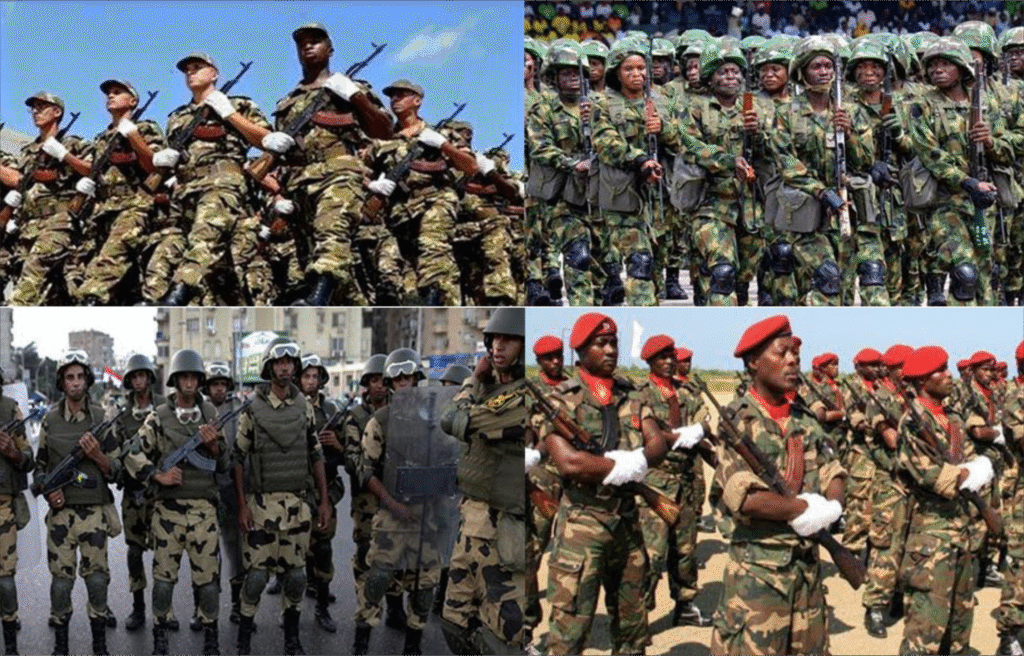
In a continent defined by diversity, rapid change, and resilience, military power remains both a measure of national pride and a reflection of political will. Africa’s armies are evolving as instruments of war and institutions extremely intertwined with humanitarian response, national unity and regional stability.
The 2025 Global Firepower Index, which evaluates the military strength of more than 140 countries based on manpower, equipment, logistical capability, and geography, reveals a complex portrait of Africa’s defence landscape. While the rankings celebrate technological advancement and modernization, they also tell an unfathomable story, one that is always faced with security challenges, governance intermittent inappropriateness and the human cost of maintaining peace in turbulent times.
As the continent grapples with threats ranging from insurgencies to climate-induced displacement, these militaries stand at the intersection of defence, politics, and social resilience.
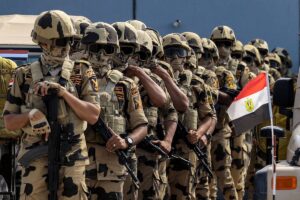 1. Egypt (Global Rank: 19) — The Strategic Giant of North Africa
1. Egypt (Global Rank: 19) — The Strategic Giant of North Africa
For decades, Egypt has stood as Africa’s military powerhouse. A nation where the army’s role extends far beyond the battlefield. From border control in the Sinai Peninsula to peacekeeping in the Horn of Africa, the Egyptian Armed Forces wield influence across both regional diplomacy and domestic governance.
Supported by U.S. and Russian partnerships, Egypt’s military operates one of the continent’s most sophisticated air and naval fleets. Yet, behind the strength lies a delicate balance: the military’s deep involvement in the national economy has fueled debate about civilian oversight and economic equity.
Still, in an unstable region, Cairo’s dominance has become synonymous with continuity — a reminder that for many African nations, security remains the bedrock of political order.
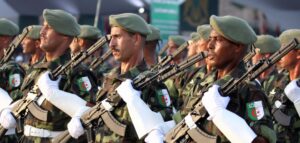 2. Algeria (Global Rank: 26) — Fortress of the Maghreb
2. Algeria (Global Rank: 26) — Fortress of the Maghreb
Algeria maintains one of the continent’s largest defence budgets, driven by concerns over terrorism, border security, and Sahel instability. Its partnership with Russia and China continues to shape its modernized fleet of aircraft and armoured vehicles.
However, Algeria’s military prominence is also political. Since independence, the army has served as the ultimate guarantor of state continuity, a role that has drawn both respect and criticism. While citizens rely on the army for national unity, calls for democratic reforms underscore the tension between military guardianship and civilian governance.
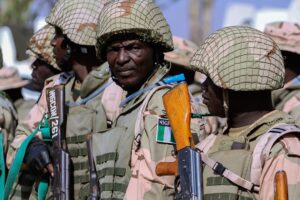 3. Nigeria (Global Rank: 31) — Africa’s Most Populous Nation on Guard
3. Nigeria (Global Rank: 31) — Africa’s Most Populous Nation on Guard
In Nigeria, military power is not just about deterrence. It is a daily fight for survival. The Nigerian Armed Forces have evolved under the pressure of internal insurgencies, particularly the decade-long Boko Haram conflict in the northeast and growing banditry in the northwest.
Massive investments in local defence production and counterterrorism training have strengthened capacity, but the military’s dual role in combat and humanitarian response exposes its strain. Soldiers not only secure borders but also deliver aid, protect displaced persons, and rebuild communities ravaged by conflict.
In a country where regional disparities and ethno-religious divisions persist, the army remains both a symbol of unity and a reminder of the fragile peace it strives to maintain.
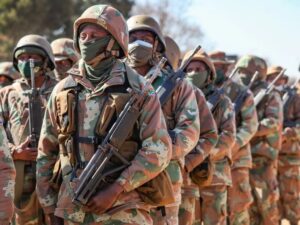 4. South Africa (Global Rank: 40) — The Technology-Driven Sentinel
4. South Africa (Global Rank: 40) — The Technology-Driven Sentinel
With one of the continent’s most advanced defence industries, South Africa stands out for its innovation rather than sheer numbers. The country’s arms manufacturer, Denel, has historically supplied equipment to regional allies, making South Africa a hub for defence technology.
However, budget constraints and socio-economic challenges have limited the military’s reach. The armed forces increasingly participate in peacekeeping and disaster relief across Southern Africa, reflecting Pretoria’s pivot toward humanitarian leadership rather than hard power projection.
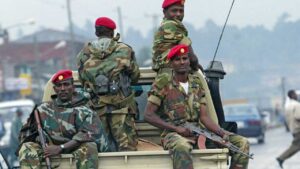 5. Ethiopia (Global Rank: 52) — Resilience Through Adversity
5. Ethiopia (Global Rank: 52) — Resilience Through Adversity
Few armies embody national identity like Ethiopia’s. Despite enduring internal strife and the aftermath of the Tigray conflict, Ethiopia’s military remains one of the largest and most battle-hardened in Africa.
Its strength lies in manpower and experience, but the political challenge lies in rebuilding trust between the state and its people. To many of Ethiopians, the army is both protector and participant in national trauma, as a reminder of how intensely military and political realities intertwine in Africa’s Horn.
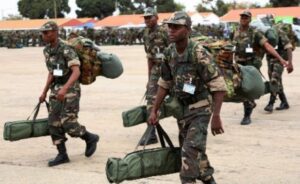 6. Angola (Global Rank: 56) — Rebuilding After the Ruins
6. Angola (Global Rank: 56) — Rebuilding After the Ruins
Emerging from years of civil war, Angola has turned its oil revenues into engines of recovery and part of that recovery includes rebuilding its military. Modern aircraft, naval assets, and an emphasis on training have turned Angola into a rising force in Central Africa.
The country’s leadership views stability as essential to economic growth, and the army often plays a social role, aiding infrastructure projects and emergency responses. The message is clear: national defence in Angola is as much about reconstruction as protection.
 7. Morocco (Global Rank: 59) — The Diplomatic Defender
7. Morocco (Global Rank: 59) — The Diplomatic Defender
Morocco blends military sophistication with international diplomacy. Equipped with a mix of Western and domestic technologies, its forces operate in tandem with the country’s broader geopolitical ambitions, from Western Sahara to partnerships with the U.S. and France.
Morocco’s military is deeply enmeshed in regional stability, balancing counterterrorism operations in the Sahel with humanitarian engagement in Africa’s peacekeeping missions.
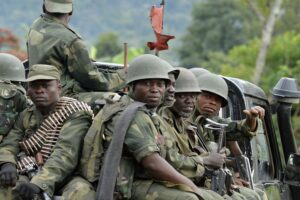 8. Democratic Republic of the Congo (Global Rank: 66) — A Giant Awakening
8. Democratic Republic of the Congo (Global Rank: 66) — A Giant Awakening
The DRC, with its vast population and resources, has long been undermined by internal conflict and logistical challenges. Yet recent efforts to modernize its forces and streamline command structures have signaled progress.
As the army works to stabilize the eastern provinces, it is increasingly involved in humanitarian protection such as escorting refugees, securing food corridors and combating illegal mining networks that fuel unrest. Its story is one of transition: from a fragmented force to a potential stabilizer in Central Africa.
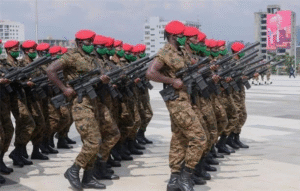 9. Sudan (Global Rank: 73) — Power Amid Political Transition
9. Sudan (Global Rank: 73) — Power Amid Political Transition
Sudan’s military occupies a pivotal space between politics and survival. Following the country’s tumultuous transitions, the armed forces remain one of the few enduring institutions capable of maintaining order.
However, military involvement in governance has drawn international scrutiny, as civilians push for democratic control. Despite internal divisions and conflict, Sudan’s soldiers continue to perform critical humanitarian tasks, from flood relief to securing volatile border zones.
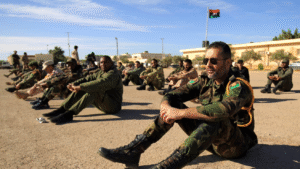 10. Libya (Global Rank: 76) — Rebuilding the Fragments of Power
10. Libya (Global Rank: 76) — Rebuilding the Fragments of Power
Once one of North Africa’s strongest militaries, Libya is still emerging from the chaos of civil war. Competing factions and international interventions have splintered the army, but efforts to unify the forces under a national command are gaining traction.
As peace efforts advance, Libya’s military rebuild is also a story of national reconciliation. Restoring the army’s unity is seen not only as a security necessity but as a step toward healing a society fractured by years of conflict.
Beyond firepower, the human and political dimensions of strength in Africa’s military bodies are more than arsenals; they are mirrors of state-building, national identity and resilience. While rankings like the Global Firepower Index capture hardware and manpower, they don’t measure the human dimension; and some of this index comprise soldiers serving in flood zones, soldiers rescuing civilians from insurgent-held villages, or soldiers standing as the last line between stability and collapse.
Across the continent, investment in defence is increasingly tied to humanitarian mandates, regional cooperation, and peacekeeping efforts. As Africa redefines its place in global geopolitics, its strongest armies are also becoming agents of adaptation, confronting wars and also the human crises that follow them.
In the end, Africa’s military strength is not only measured in tanks or jets, but in the quiet resolve of nations determined to protect, rebuild and endure.






